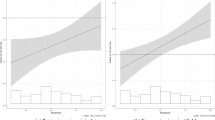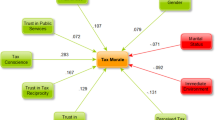Abstract
This study examines how the perceptions of fairness in tax regimes influence tax morale. We empirically demonstrate the importance of the perception of fairness in shaping tax morale and the subsequent attitudes by examining data on approximately 7300 taxpayers by the National Survey of Tax and Benefit of South Korea. To estimate the tax moral inherent in taxpayers, we adopt the framed and hypothetical tax evasion question method. We find that taxpayers are more likely to pay taxes if they perceive the tax system as fair in terms of vertical, horizontal, exchange, and distributive fairness, while procedural fairness is not statistically significant. Our results also indicate that the peer effect and trust in government have an essential positive correlation with tax morale.

Similar content being viewed by others
Notes
For a more detailed explanation, the tteokbokki (spicy stir-fried rice cakes) is one of the most popular Korean street foods; tteokbokki shops are common in Korea and can be found nearly everywhere. After deducting a series of expenses—such as rental fees, labor, and material costs—80 million South Korean won (approximately 73,000 dollars) is an ordinary sales figure in South Korea in 2016.
References
Adams JS (1965) Inequity in social exchange. In: Berkowitz L (ed) Advances in experimental social psychology, 2nd edn. Academic Press, pp 267–99
Allingham MG, Sandmo A (1972) Income tax evasion: a theoretical analysis. In: James S (ed) Taxation: critical perspectives on the world economy, 3rd edn. Routledge, pp 323–338
Alm J, Antoine M (2020) 40 years of tax evasion games: a meta-analysis. Exp Econ. https://doi.org/10.1007/s10683-020-09679-3
Alm J, Benno T (2006) Culture differences and tax morale in the United States and in Europe. J Econ Psychol 27:224–246
Alm J, Gary HM, Schulze WD (1992) Why do people pay taxes? J Public Econ 48:21–38
Alm J, Betty RJ, Michael M (1993) Fiscal exchange, collective decision institutions, and tax compliance. J Econ Behav Organ 22(3):285–303
Alm J, Isabel S, Ana D (1995) Economic and noneconomic factors in tax compliance. KYKLOS-BERNE- 48:3–3
Barr A, Danila S (2009) The effects of externalities and framing on bribery in a petty corruption experiment. Exp Econ 12:488–503
Batrancea L, Anca N, Jerome O, Christoph K, Erich K, Erik H, Avi W et al (2019) Trust and power as determinants of tax compliance across 44 nations. J Econ Psychol 74:102191
Chander P, Louis LW (1998) A General characterization of optimal income tax enforcement. Rev Econ Stud 65:165–183
Cummings RG, Jorge M, Michael M, Benno T (2009) Tax morale affects tax compliance: evidence from surveys and an artefactual field experiment. J Econ Behav Organ 70:447–457
Cyan MR, Antonios MK, Jorge M (2016) The Determinants of tax morale in Pakistan. J Asian Finance Econ Bus 47(December):23–34
Dijke M, Peter V (2010) Trust in Authorities as a boundary condition to procedural fairness effects on tax compliance. J Econ Psychol 31:80–91
Engel C, Luigi M, Azzurra M (2020) Tax morale and fairness in conflict an experiment. J Econ Psychol 81(December):102314
Erzo FP, Lutterman FP, Monica S (2014) Tax Morale. J Econ Perspect 28:149–168
Finocchiaro CM, Ilde R (2014) Tax compliance under horizontal and vertical equity conditions: an experimental approach. Int Tax Public Finan 21:560–577
Fortin B, Guy L, Marie-Claire V (2007) Tax evasion and social interactions. J Public Econ 91:2089–2112
Gobena LB, Marius V (2016) Power, justice, and trust: a moderated mediation analysis of tax compliance among Ethiopian business owners. J Public Econ 52:24–37
Hartner M, Silvia R, Erich K, Alfred S (2008) Procedural fairness and tax compliance. Econ Anal Policy 38:137–152
Henrich J, Steven JH, Ara N (2010) Most people are Not WEIRD. Nature 466:29–29
Hofmann E, Erik H, Erich K (2008) Preconditions of voluntary tax compliance: knowledge and evaluation of taxation, norms, fairness, and motivation to cooperate. Zeitschrift Fur Psychologie 216(4):209–217
Jacquemet N, Luchini S, Rosaz J, Shogren JF (2019) Truth telling under oath. Manage Sci 65:426–438
Jacquemet N, Luchini S, Malézieux A, and Shogren JF (2020) “Who’ll stop lying under oath? Empirical Evidence From Tax Evasion Games. Eur Econ Rev 124(103369):103369
Kastlunger B, Edoardo L, Erich K, Alfred S (2013) Powerful authorities and trusting citizens: the slippery slope framework and tax compliance in Italy. J Econ Psychol 34(February):36–45
Kim CK (2002) Does fairness matter in tax reporting behavior? J Econ Psychol 23:771–785
Kim Y (2021) Politics, religion, and tax incentives for charitable giving in South Korea. KER 37:141–155
Kinsey KA, Harold GG (1993) Did the Tax Reform Act of 1986 improve compliance? Three studies of pre- and post-TRA compliance attitudes. Law & Policy 15:293–325
Kirchler E (2007) The economic psychology of tax behaviour. Cambridge University Press
Kirchler E, Erik H, Ingrid W (2008) Enforced versus voluntary tax compliance: the ‘slippery slope’ framework. J Econ Psychol 29:210–225
Lindsay IK (2016) Tax fairness by convention: a defense of horizontal equity. Fla Tax Rev 19:79
Mazar N, On A, Dan A (2008) The dishonesty of honest people: a theory of self-concept maintenance. J Mark Res 45:633–644
Mickiewicz T, Anna R, Arnis S (2019) To pay or not to pay? Business owners’ tax morale: testing a neo-institutional framework in a transition environment. J Bus Ethics 157:75–93
Mikesell JL, Liucija B (2007) The tax compliance puzzle: evidence from theory and practice. Int J Public Adm 30:1045–1081
Moser DV, John HE, Chung KK (1995) The effects of horizontal and exchange inequity on tax reporting decisions. Account Rev 70:619–634
Murphy K, Tom T (2008) Procedural justice and compliance behaviour: the mediating role of emotions. J Appl Soc Psychol 38:652–668
Oladele R, Foluso OA, Ahmodu AO, Yusuff SA, Alade M (2019) Tax enforcement tools and tax compliance in Ondo State. Nigeria Acad J Interdiscip 8:27
Roberts ML, Peggy AH (1994) Progressive taxation, fairness, and compliance. Law & Policy 16:27–48
Rodriguez-Justicia D, Theilen B (2018) Education and tax morale. J Econ Psychol 64:18–48
Spicer MW, Lee AB (1980) Fiscal inequity and tax evasion: an experimental approach. Natl Tax J 33:171–175
Torgler B (2003b) Tax morale, rule-governed behaviour and trust. Const Political Econ 14:119–140
Torgler B (2016) Tax compliance and data: what is available and what is needed. Aust Econ Rev 49:352–364
Torgler B (2002) Vertical and exchange equity in a tax morale experiment. Citeseer. https://citeseerx.ist.psu.edu/viewdoc/download?doi=10.1.1.200.5116&rep=rep1&type=pdf
Torgler B (2003a) Tax morale and institutions. https://doi.org/10.2139/ssrn.663686
Trivers RL (1971) The evolution of reciprocal altruism. Q Rev Biol 46:35–57
Verboon P, Sjoerd G (2009) The role of fairness in tax compliance. Neth J Psychol 65:136–145
Wenzel M (2002) The impact of outcome orientation and justice concerns on tax compliance: the role of taxpayers’ identity. J Appl Soc Psychol 87:629–645
Wenzel M (2003) Tax compliance and the psychology of justice: mapping the field. W: V. Braithwaite (red.), taxing democracy: understanding tax avoidance and evasion (s. 41--69).Ashgate, Aldershot.
Acknowledgements
We thank the anonymous reviewers for their valuable remarks. The datasets generated during the current study are available in the National Survey of Tax and Benefit repository, https://www.kipf.re.kr/panel/.
Author information
Authors and Affiliations
Corresponding author
Ethics declarations
Conflict of interest
The authors declare that they have no conflict of interest.
Additional information
Publisher's Note
Springer Nature remains neutral with regard to jurisdictional claims in published maps and institutional affiliations.
Appendices
Appendix A
Appendix B
Rights and permissions
About this article
Cite this article
Kim, Y., Wan, H. The effect of fairness on tax morale in South Korea: a framed question approach. Int Rev Econ 69, 103–123 (2022). https://doi.org/10.1007/s12232-022-00387-3
Received:
Accepted:
Published:
Issue Date:
DOI: https://doi.org/10.1007/s12232-022-00387-3




